Editor’s note: The following is part 1 of a two part article series from special contributor Chip McClure of Jet Acquisitions. In part 1, Chip gives his breakdown on the differences between the two systems. In the forth coming part 2, Chip will describe his hands on experience with the Pro Line Fusion and offer his final thoughts on the two systems.
Whether you are flying a new King Air or a Legacy King Air, the chances are strong that you are using either Rockwell Collins or Garmin based avionics.
Over the years, King Air have come standard with a Collins panel. However, during this time, the Garmin G1000 retrofit has become increasingly popular and prevalent in King Airs. It was questioned if Textron would strike a deal with Garmin and have new production King Airs come standard with the G1000. The speculation ended definitively when Rockwell Collins took center stage at EBACE 2015 in Geneva, Switzerland and dropped a bombshell.
Rockwell Collins announced that its new Pro Line Fusion touchscreen flight displays would be factory installed on all new King Air. Textron celebrated certification of the new system in November and deliveries of new Pro Line Fusion equipped King Airs followed shortly after.
While Garmin has certainly been challenged the real question is what does this mean for those of us who do not fit into the new King Air upper echelon? Will Garmin and the G1000 retrofit lose market share and relevancy to the new touchscreen system? The answer is not as simple as it may seem.
The first step in understanding your new option in King Air avionics is to understand what it isn’t. It is not a complete new retrofit installation like the Garmin 1000, nor does it notably decrease the empty weight of the aircraft. The new technology is mostly focused in the screens. The rest of the system still relies heavily on existing Collin’s equipment, including the original Collin’s Autopilot.

This is where it gets a bit tricky, as most King Airs can be completely retrofitted with the Garmin G1000. The process involves removing all existing avionics (including the autopilot) and then having the G1000 installed. The only limitation is the availability of the STC for your particular aircraft. The limitation of the Collins Pro Line Fusion install is that it uses the existing autopilot, which must be the Collins APS-65 Autopilot (rumors of APS-80 and -85 not confirmed as of writing this article).
The good news is that either option is a win-win for us King Air pilots. Many newer King Airs will have the APS-65, which serves as a great autopilot. For all others there’s the G1000 from Garmin with its own great autopilot! Most older King Airs would benefit from the complete Garmin retrofit and the newer King Airs with the required autopilot make the touchscreen Pro Line Fusion a very attractive option.

The Garmin G1000 is very user friendly and familiar to most pilots due to many training King Air aircraft having it installed. With the Fusion being fairly new, the familiarity is less likely. However, the Fusion should not be ruled out because of this since even Garmin minded pilots will find Rockwell Collins Pro Line Fusion flight deck to be intuitive and easy to use. Its like going to a new city and instantly knowing your way around. You think, “Wouldn’t it be nice if I could just point my finger there and it would do it for me?” And lo and behold, it does!
Ultimately, the important thing to remember is that the G1000 is a complete new avionics suite and the Fusion is (for the most part) three new touchscreens. The installation cost of the two units is similar. With Garmin you pay for new equipment. With Collins, you pay for new (and VERY good) technology.
In a head to head competition for the King Air enthusiast the Garmin G1000 is currently still on top with the number of units in the field and reputation established thus far. The G1000 will not easily fall to the new competitor, even with it coming from Collins; a company that has been around much longer than Garmin.
Chip McClure is the founder and CEO of Jet Acquisitions, an aircraft acquisition company based in Georgetown, Texas. He has worked in the aviation industry for over a decade, including multiple projects involving King Air. His company website is www.jetacq.com and Facebook page is www.facebook.com/chipmcclure.aviation/. Chip’s aviation blog can be found at http://jetacq.blogspot.com/.

